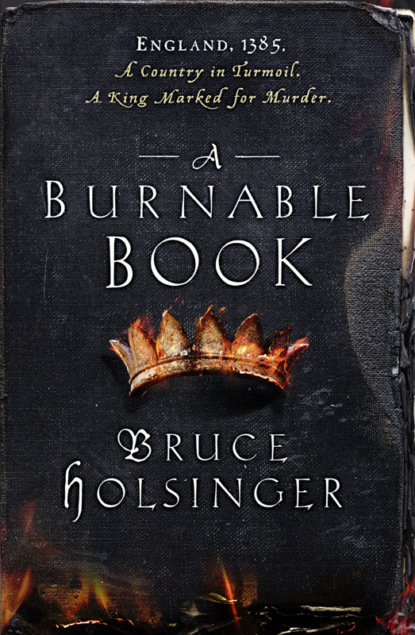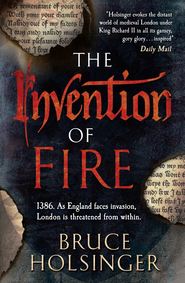По всем вопросам обращайтесь на: info@litportal.ru
(©) 2003-2024.
✖
A Burnable Book
Автор
Год написания книги
2019
Настройки чтения
Размер шрифта
Высота строк
Поля
‘What brought you to the moor? Strange place for a pair of mauds to go a-wandering.’
She shrugged. ‘Sometimes the men like it, that little shed out there near Bethlem. They can be – free with themselves.’
‘Lets them scream for the teat, like the hungry babes they be,’ Joan put in helpfully.
Bickle’s scowl softened. ‘Haven’t changed a bit, Joan Rugg.’ She gave him a girlish grin. He turned back to Eleanor. ‘So you were heading out that way with some jakes, you and—’
‘Mary Potts,’ said Joan.
‘You and this Mary Potts, right, taking some fellows out there, was it?’
Eleanor shook her head. ‘We were looking for somebody.’
‘Looking for somebody. And who were you looking for?’
Eleanor said nothing.
‘And who were you looking for then?’
‘Tell him, Eleanor,’ said Joan, her voice hardening. ‘You tell him or I will myself, girl.’
Eleanor hesitated, feeling protective of Agnes.
He edged closer. ‘This isn’t only about a murder, now. This young lady went and stole something from the very Duke of Lancaster before she got herself killed. A book, is what it was. A valuable book. And from what I seem to be hearing from your pretty little mouth, could be your somebody went and stole it from her, yeah? Went and stole it from that girl, then killed her, yeah?’ Bickle grasped her chin and turned her face to his. There was a plug of mint in his lip, his breath strangely pleasant, though his hands smelled of metal.
Eleanor tried to shake her head. ‘I know less than nothing about the Duke of Lancaster, nor about some old book.’
‘Could be, could be,’ said Bickle. ‘But I suspect your somebody might.’
‘I – I couldn’t say naught about that, Master Bickle.’
‘You couldn’t say naught.’ He leaned in. ‘A dead lady’s one thing, Edgar.’ He spat her man name in a tone that terrified her, then gripped her forearm. ‘French lady of means dead on the Moorfields, you got the whole city asking questions: constables, subconstables, beadles and aldermen, the coroner and his deputy, all the way up to the king’s household wants to know.’ His grip tightened. ‘But a dead maudlyn? Who’ll give half a mind to that, hmm?’ His gaze swept her face. She saw the flicker of revulsion. ‘Dead swerver like you, floating in the Walbrook with the cats?’
Swerver. And that’s what I am, like it or not. A man in body, a woman in soul. One day a he, the next a she, a stiff cock for some, a tight arse for others. Provided they could pay, Eleanor would do all and be all for her loyal jakes, and she had plenty who liked taking it and giving it every which way. Sometimes as a man, sometimes as a woman, sometimes as both at once, though that could get complicated. Why, just last week there was this gongfarmer, big-muscled and hairy as you could like, but get him in the stall and he starts to whinny like a gelding. Or a mare, more like, wants to take—
‘Speak to the man, El,’ said Joan Rugg. ‘You speak, or I will.’
As Eleanor sat on the goldsmith’s bench, her own life threatened over the death of a stranger, she felt her fear turn slowly to resentment, then to anger. She knew it wasn’t Agnes who killed that girl on the Moorfields. Yet who’s Agnes Fonteyn to leave such a mess for Joan’s mauds to clean up behind her? A book, the beadle says. A valuable book, stolen from Lancaster. And now Agnes has it. What’s that whore doing with a book? Worse, she’s keeping it to herself, after all I’ve done for her these years, the coin and bed we’ve shared, now here I am on a beadle’s bench, getting this?
Eleanor’s lips were inches from Bickle’s ear. ‘Agnes,’ she said. ‘Her name is Agnes Fonteyn.’ And Eleanor Rykener, she did not add, will find her first.
SIX (#ulink_30ab0498-bdc1-5089-94c4-f55ecadbc298)
Florence, near Orsanmichele
‘You leave tomorrow. You will join the delegation at Bologna.’ Adam Scarlett found a more comfortable position on the stool, one of four in the low single room that served as the friar’s occasional dwelling. His left foot rested on the floor, his right on the hearth, scattered with ash and meal. As he spoke to Paolo Taricani he rocked himself slowly back until his head touched the stone wall, the cool on his neck a pleasant contrast to the chamber’s stuffy heat.
‘I will not do it.’
‘Of course you will.’
‘No.’
‘Brother Paolo—’
‘Send Teti. Or Efisio. Efisio makes sense. He is quick, young. Gets it up and in and twisted before the florin hits the floor.’
Scarlett ignored the hurried pleading. ‘But you are the best, Paolo. And Ser Giovanni knows it. That is why he has chosen you for this extraordinary task.’
‘I am Il Prescelto, then.’ Taricani’s sarcasm was thick, and Scarlett worried this could get difficult.
He sighed, recalling what Hawkwood had told him. Take him as far as you can, Adam. If he’s still balking bring him to me.
He tacked right, appealing to Taricani’s ego; left, to his civic pride. Nothing worked. Finally Scarlett stood. ‘Let’s go, Brother Paolo.’
The man frowned suspiciously. ‘Go where?’
‘San Donato a Torre.’ Hawkwood’s villa that season, a short ride to the north.
Taricani shook his head, still showing no fear. That could change, and quickly, but for the moment Scarlett let him prattle on. ‘I will not go. I will not do this – this “extraordinary task”, and I will not go with you.’ He spat on the floor. His own floor. He looked tense, about to spring. His hand moved to his belt.
Scarlett spread his arms, slowly, and raised his hands to his sides. He gave the man a conciliatory nod. ‘Bene,’ he said, and left the tenement, hating what he had to do next.
Taricani’s house sat at the ass end of a narrow alley leading south from Orsanmichele. At the other end waited three of Hawkwood’s roughest men, unmounted at the moment, their horses posted out in the piazza. Scarlett gave them the signal, then went to wait in front of the church, selecting the sharp corner at Via dei Pittori as his spot. The crumbling house of the Bigallo loomed overhead, knots of thirsty pilgrims draped around the plinths, waiting, like Paolo Taricani, for a miracle that would never come. On a high scaffold an old painter and his apprentice were at work retouching a David, hurling his stone at the giant. Scarlett wondered whether the outmatched Paolo, too, would fight, and if so, for how long. The man had too much to lose, though, and it was not long until he stumbled into the piazza, his hands bound at his waist, one eye blackened, the other cut and swollen.
Hawkwood’s men had fared no better. One of them had earned a long gash across his cheek, which he wiped with a quiet fury as the others threw the friar over a horse and set off across the piazza. Scarlett took his time, arriving back at San Donato a full hour after the others. Hawkwood had waited for him, though, and as Scarlett walked through the yard toward the house the condottiero was just coming out the villa’s entrance. The men had bound Taricani to a chair, an ornate, high-backed seat brought out from the hall, and the man’s thin face now showed a few more bruises, a second black eye.
Hawkwood stood before the chair, fixing Taricani with a friendly smile. ‘You were Bernabò Visconti’s swiftest knife for years, Brother Paolo. Why he let you retire I’ll never know.’
Taricani shrugged. ‘The signore has his methods, Ser Giovanni.’
‘Indeed,’ said Hawkwood. ‘Might be interesting to plumb them with you someday.’
Taricani bunched his lips, exuding confidence. ‘At your pleasure, Ser Giovanni.’
Stay humble, Scarlett silently warned the man.
Hawkwood knelt in the dirt. He placed a palm on each of Taricani’s knees, looked up at his face. ‘You have a beautiful woman, Brother Paolo.’ He let that sit, then, ‘And a daughter who ripens by the day. My men have seen her at the markets, Paolo. She can’t be more than, what, ten, eleven?’
Taricani nodded, his eyes darkening.
‘And her name, Paolo. It is memorable, isn’t it, but I seem to have forgotten it. Help an old man, Paolo. What is your daughter’s name?’
‘Pic-Picco-Piccola-Piccolamela, sire.’
Hawkwood chuckled at Taricani’s difficulty. ‘Piccolamela. Now I remember! “Little apple” in my native tongue. An exquisite name for an exquisite girl, this virgin bastardess of an uncelibate friar. Did you choose this name yourself, Paolo?’
‘My – her mother chose it, sire.’






